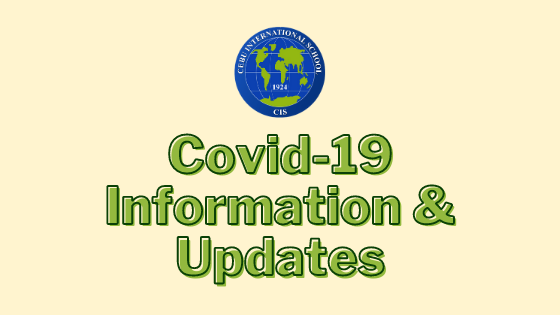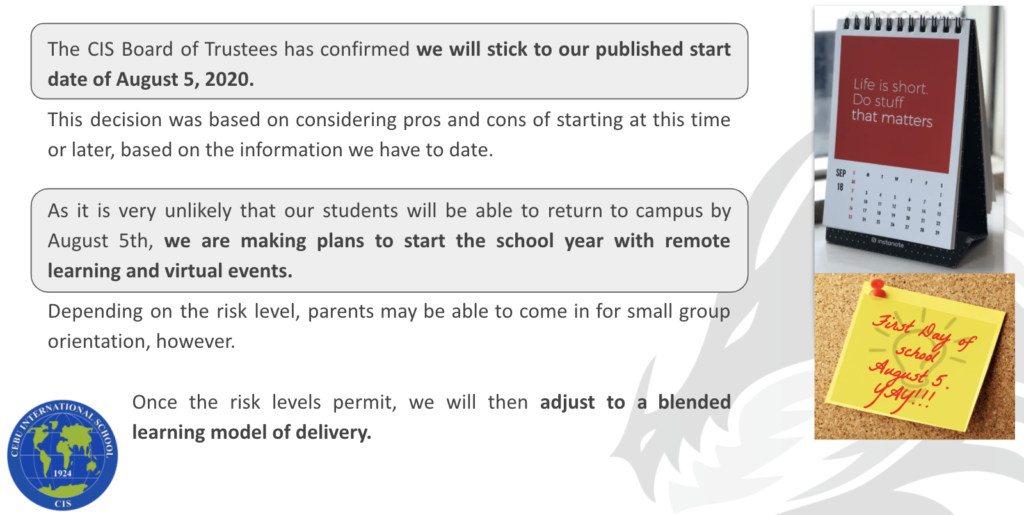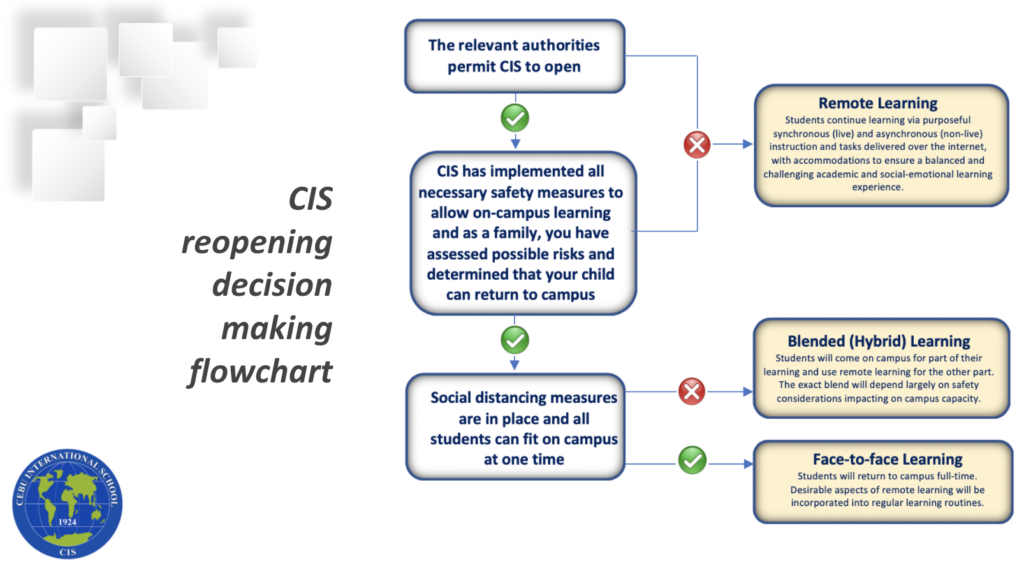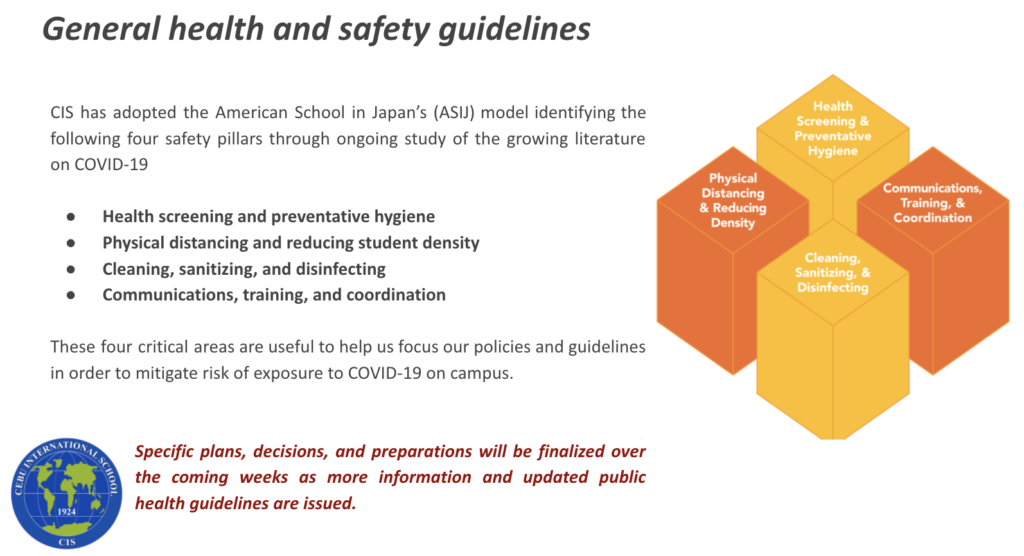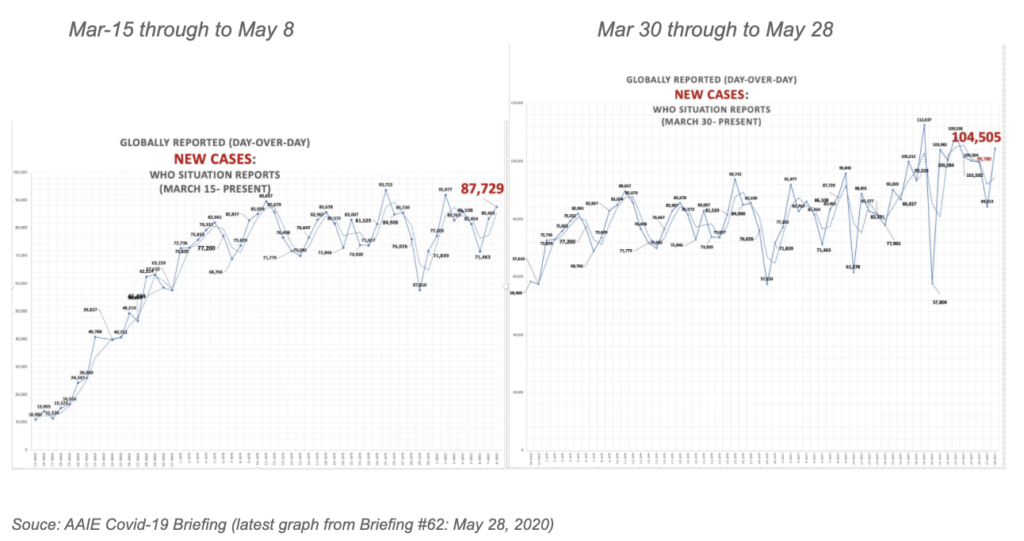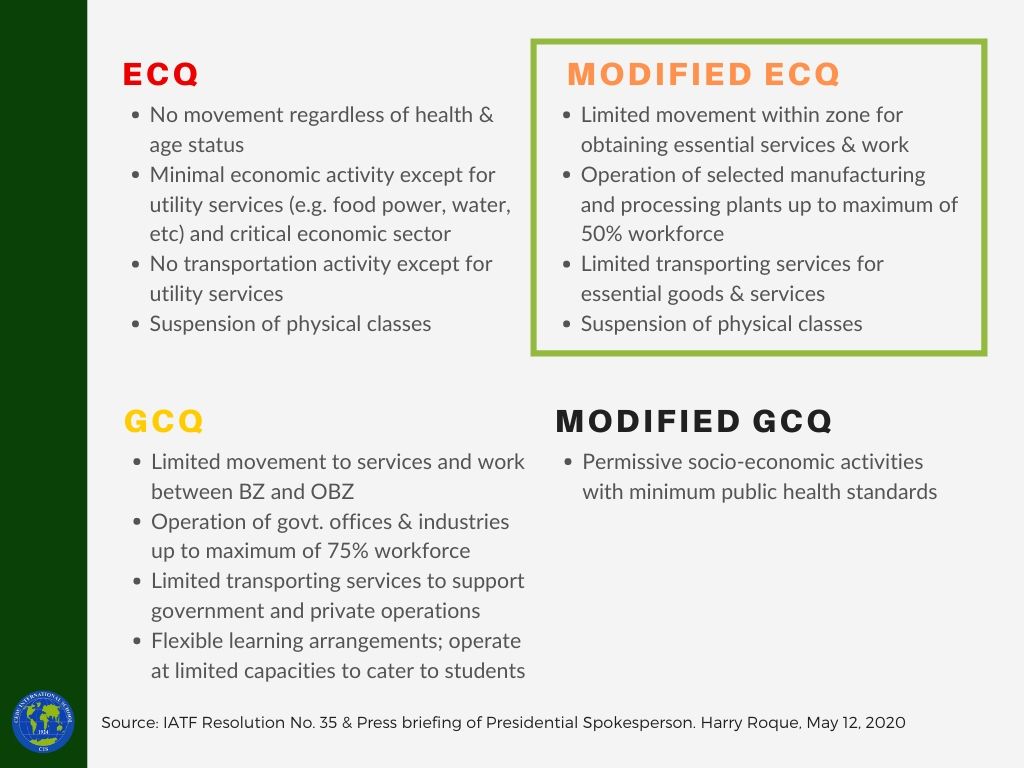Covid-19 Information & Resources
With the suspension of physical classes, learning does not end at Cebu International School! Our students are accustomed to learning on digital devices, and we have implemented our remote learning protocols where teachers prepare learning tasks communicated through our list of Core Digital Learning Platforms, and using a variety of other online learning tools.
Please find details in our dynamic document, Remote Learning Guidelines for Students & Parents.
Summary of Covid-19 information updates to the CIS Community
July 12, 2020
I trust you are all well, and are enjoying your summer vacation. As a school, we are committed to facing the challenges of the Covid-19 crisis together, and by maintaining a calm focus on our guiding statements, we are confident we will continue to provide a meaningful continuous learning experience for our students, in whatever mode is the safest for all community members.
In order to prepare for these new modes of learning, various personnel at CIS have been focusing on researching, reflecting, discussing, debating and seeking advice on how we can best reopen CIS in the new school year. This is a huge challenge due to the ambiguities associated with the constantly changing situation, and the uniqueness of this new situation we find ourselves in.
Our 2020/21SY will be different by necessity. It will require the support of the CIS community as there will be many challenges we will have to face together. Through it all, please know that CIS is committed to doing everything that we feasibly can to keep our students, faculty, support staff, and families safe.
Re-opening Plan Key Areas
a) Our starting date is August 5th
b) We will vary learning delivery modes depending on the risk levels
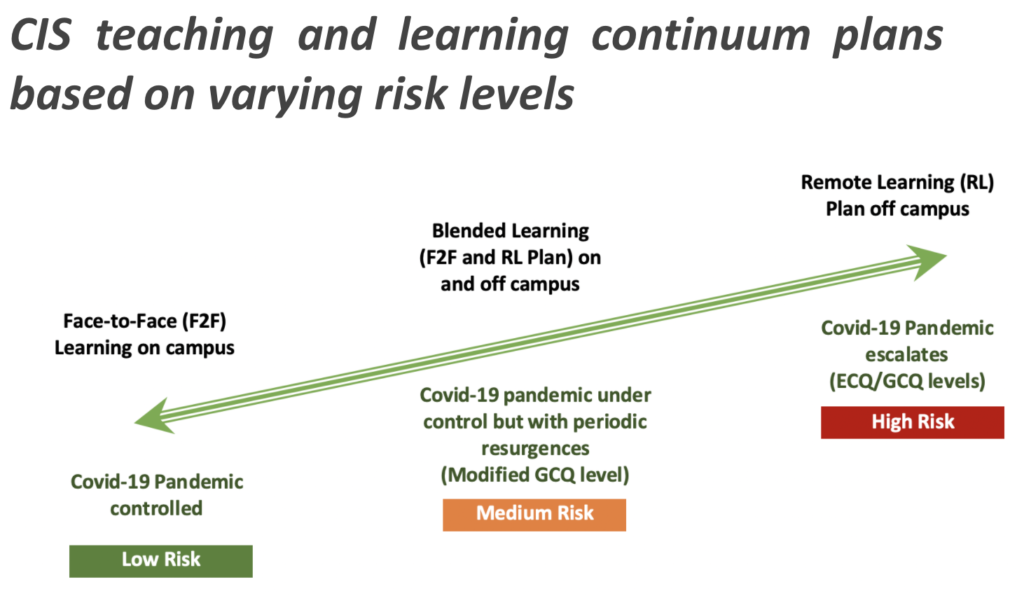 c) Decision making flowchart for deciding when to transition to a delivery mode
c) Decision making flowchart for deciding when to transition to a delivery mode
d) We continue to develop our remote and blended learning programs
We are committed to continually seeking more effective and efficient ways to address whole groups and small groups, as well as individualized and personalized learning. Key components of remote and blended learning have been identified (see diagram below), and we are in the process of using our recent remote learning experiences and new findings to refine our learning program in order to address all areas better.
In particular, we see a need to develop our students’ social and emotional support to ensure they are motivated to learn, as well as further develop their ATL skills. Support for parents is another area we have identified for further development, such as helping equip them with knowledge and skills to support their children at home, and ensuring student activities are clearly defined so they can help their children if needed.
As we transition back onto campus using a blended learning model, we our delivery models will continue to keep these key components foremost. We are currently considering a number of blended learning models that we can adopt, as the situation demands.
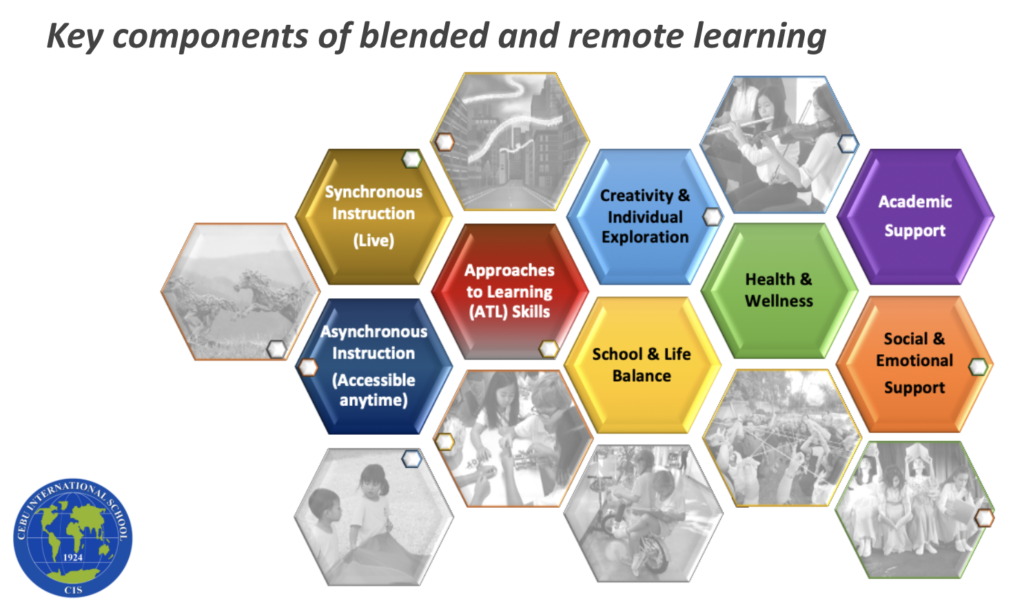 e) Community safety when we are able to be back on campus
e) Community safety when we are able to be back on campus
Some specific strategies of note being planned to support this safety model are:
- Limiting access to campus to essential personnel only, and controlling movement within campus
- Health screening of all entrants including a new thermal scanner upon entry, and Covid-19 testing of all adults who work on campus
- Required use of masks (and other PPE as required), frequent hand washing schedules, and availability of hand sanitizer as key preventative hygiene measures
- Social (physical) distancing measures in classrooms, movement protocols, reducing student density when required, and use of class safety “bubbles” (groups of students who do not mix with other groups)
- Staggered start/end times and flexible scheduling options to reduce student density in any one area
Stringent cleaning, sanitizing, and disinfecting practices - Communications, training, and coordination to ensure everyone is aware and committed to maintaining a safe environment.
June 5, 2020
Dear CIS Community,
We did it! Congratulations on successfully completing our 2019/2020 School Year. We were confident we would get through it, but it is a relief to finally get to this point. No one expected we would end up completing the year virtually, but circumstances dictated we needed to do so, and I am proud of being part of a community who all pulled together to make the best of the situation. As things start to open up over our summer break, I hope you and your family get time to refresh and renew yourselves and are ready to approach our 2020/2021 School Year with an open mind ready to face the challenges of a new year!
I thought I would share the following ACCEPT advice to deal with crisis fatigue, as I found it helpful to reflect on the various feelings I am sure we all experienced over the past 12 weeks. It is a good reminder of how it helps to be aware of the potentially negative impact of not processing our emotions to a state of accepting situations that are out of our control and focus on what we can change.
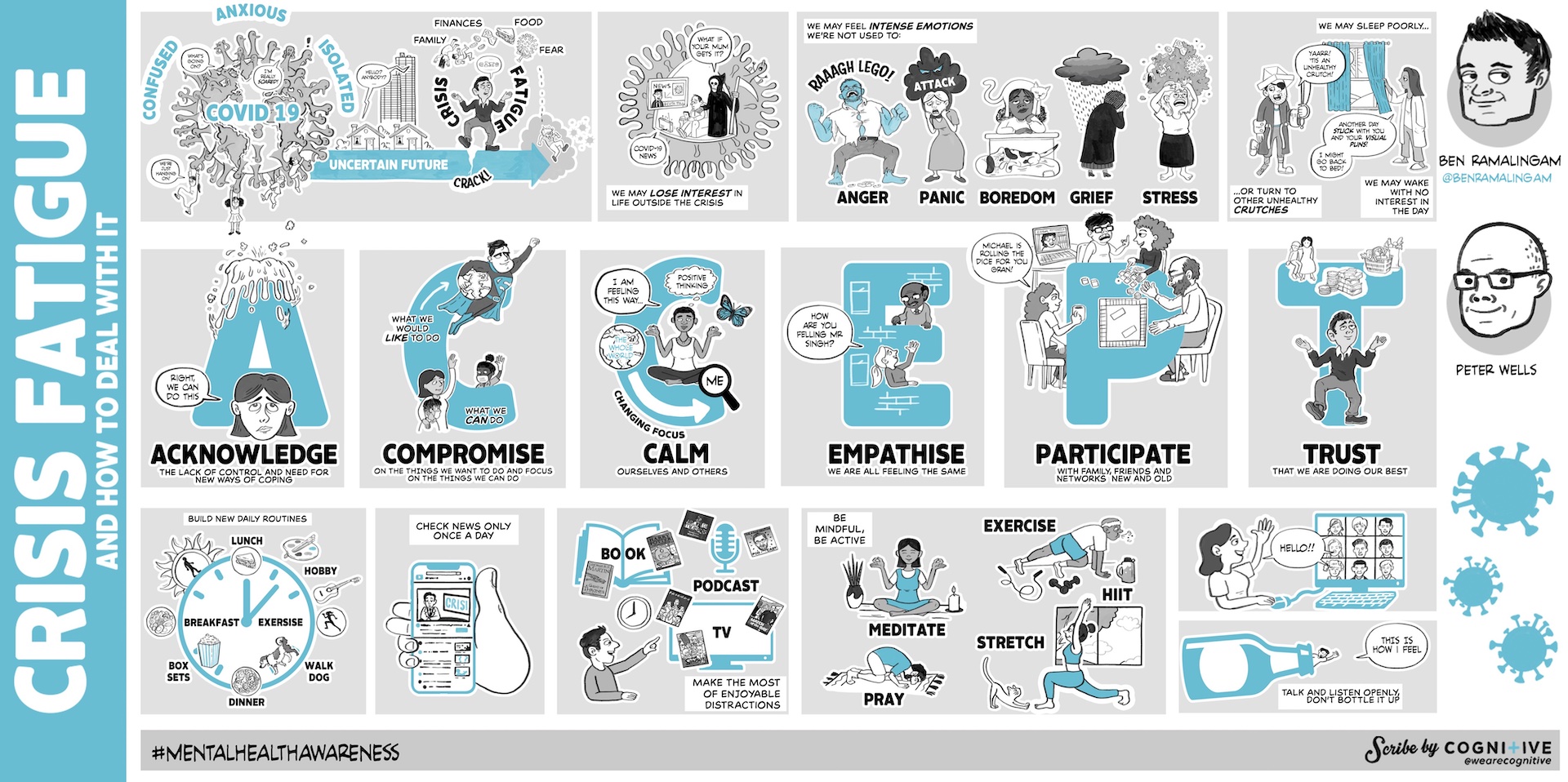
Have a wonderful summer vacation, and we will see you hopefully in August!
Regards,
Dr Gwyn Underwood
Superintendent
May 30, 2020
As a number of countries move to deescalate their pandemic restrictions, others continue to struggle with the continuing unpredictability of where new cases will pop up, and the potential for it to reappear. This is a reminder for us to continue being careful to minimize risk even as the lockdown restrictions are being eased.
a) Global new cases
Despite many countries starting to relax strict lockdown procedures, the global total number of new cases still does not show any sign of trending down. The situation is complex, however, so it is hard to draw solid conclusions for this. Some such considerations include: the expected continued global spread into new regions, increased testing in many countries picking up more cases, accusations that some countries are not providing accurate figures, while other countries count suspected cases when most only count confirmed cases, and so on.
There are many positive signs in countries that have weathered the first phase, however, and as we learn more about how best we can counter the pandemic, the better it will be for everyone.
a) Cebu
The IATF has just confirmed that Cebu City will move to a GCQ from June 1-15. Here is a simple graphic to explain what that means. Note, this change in level does not change anything for our students, and we continue with plans to complete our school year virtually.
Source (with more details): https://m.facebook.
Mayor Labella wrote in his appeal to the IATF, “as of May 27, 2020, the COVID-19 cases in the City is at 2,013, but deaths remain at 25, or a case fatality rate of 1.2%”. He adds, “there is significant indication that there is continuous reduction of additional cases in the City“.
We hope that continues, and that we see continuing improvements in the situation moving into the summer break.
PS: Good news! Philippine Airlines has just announced that they will resume international and domestic flights on selected routes from June 1, so here is one example of continuing improvements already!
As we plan for our projected opening in August, we are researching how we can ensure we continue to reach our mission and provide meaningful learning opportunities to our students, while at the same time ensuring students, faculty, staff, and any essential visitors are kept safe.
Starting Date
Our standard procedure is to maintain our published schedule as much as possible. I understand the desire for certainty, but in times of crisis, unfortunately, this is not possible and we need to make fluid plans knowing they may need to be adapted to the situation. I would like to outline our two main options at this stage, both of which have pros and cons:
- At present, we have published our start date as Aug 6. There is a distinct possibility that we may not be allowed to hold physical classes on this day. If we cannot, there is a chance we could have small group orientations at least. It would take planning, but this option could involve starting the year on our Remote Learning platform for an estimated two weeks.
- Alternatively, we could push the start of the school year to Aug 24 (which is the DepEd estimate for opening local schools), and hope for a full on-campus start then. This option would mean we would need to consider where we can make up the lost 2 weeks (with options such as Saturday morning school days, reclaiming school holiday days throughout the year, or extending the end of the year from Jun 9 to Jun 23, and so on). There is also no guarantee that Aug 24 will remain as an option to start face-to-face.
- The reality is, despite when we start, we are going to have to consider alternative options for scheduling to allow for required social distancing, and will need to make use of blended learning (both face-to-face classes and remote learning) to allow for the scheduling modifications, as well as to be prepared for any further sudden closures. (See the next section for more on these conditions).
The Board will be holding a special meeting to consider and approve options towards the end of June, so as to enable us to make an informed decision with more information on trends and possibilities.
Our planning objectives are to first and foremost maintain our school’s mission at the center of all we do. As this means the provision of a quality international education regardless of platform, we are researching our options in order to find sustainable, longer-term models that will provide us ongoing meaningful learning, and to avoid short term competing models that will give us issues at a later date.
Our comprehensive planning focuses on three main areas: enhanced preventative measures, adjustments to our program delivery, and social distancing measures. We have yet to finalize details, but research and analysis of scientific findings and other schools who have already returned to school is helping us to consider what is best for CIS. We will share our plan and ask feedback when it is ready, but for now, I wanted to highlight a few points for you as parents need to be aware of:
a) Enhanced preventative measures
Our facilities department is planning enhanced measures that include comprehensive cleaning schedules multiple times a day, signage to remind people of social distancing needs, and specialist training for our cleaning staff to assist our goal of keeping our campus as sterile as possible. At the same time, members of our Health & Safety team have started researching the desirability of introducing technology (such as a thermal scanner), and which protocols are best to minimize risk, with what required PPE.
b) Scheduling adjustments to facilitate social distancing
Establishing and maintaining effective social distancing protocols is another adjustment we need to cater to. This is a challenging area to consider, as it has a huge impact on current learning structures (such as class numbers), protocols (such as lining up) and norms (such as interactions in the classroom and playground). We are considering the need for, and pros and cons of, having partial days on campus or rotating days on and off-campus to allow for social distancing. This measure impacts daily patterns and minimizes the ability to provide for the little ones, and causes childcare issues with parents due to changing schedules.
c) Blended and Remote Learning options
Whilst we hope to start the new year back on campus with face-to-face classes, it is likely that at some point, we will be forced to do remote learning if an outbreak occurs in the community. These outbreaks are predicted to occur in various places through 2020 and could cause the government to re-introduce lockdown periods in affected areas until it is contained again.
Making strategic use of selected aspects of RL that we have developed over the past months while also having physical classes will enable us to enhance learning opportunities, and is called blended learning. Blended learning can also be used to enable us to more effectively share instructional face-to-face time in the event we have to reduce class times to cater to social distancing requirements as mentioned in b) above.
Families who lack options for child supervision at home, and especially those with both parents working and/or those with younger children, have found RL options a challenge. The teachers are constantly looking at how they can help present the learning activities to make it easier for you, but the bottom line is children this young just need guidance.
Parents who did not want to send their children to school could have the option of keeping them at home, but please note that a full RL program would not be possible while we were also offering face-to-face classes on campus. This would require more staff, and that is not an option in this economic climate.
All the above options will be considered, with the ultimate plan for CIS designed to minimize risks, while maximizing our ability to continue to offer our program.
May 15, 2020
Thank you one and all for your endurance! It is hard to believe we have now completed week eight of RL. It is also amazing to think we now only have 3 more weeks until the end of the school year! We can do it—and what an amazing accomplishment it will be!
CIS moves to a Modified ECQ from May 15-May 31 – CIS Remote Learning confirmed to continue through to the end of the school year
[Stop Press: Since publishing, the IATF has returned Cebu City to ECQ level]
As you may have heard in the news, Cebu City has now been placed on a Modified ECQ from May 15 through to May 31. The conditions of the MECQ are similar to the ECQ with regard to our operations, so as we expected, we will continue with RL. (A detailed report of details of the MECQ, ECQ, and GCQ is available in a news report here). After initially being classed under a General Community Quarantine (GCQ), Mandaue and Lapulapu Cities have also been recommended for the MECQ by the IATF – a report is available here)
Even if we are moved to a GCQ level after May 31, we only have one more week, and our students (under 20-year-olds) will still be required to continue their quarantine under that level. This announcement serves as official confirmation that due to these continued restrictions, CIS will need to finish out the 2019/20 school year virtually.
May 4, 2020
As we begin week seven of remote learning (RL), we continue to work on providing the best RL program possible, so as to ensure we reach our mission as best we can under the conditions we are forced to work under. The CIS Admin have already begun planning for the re-emergence phase, where we can return to having physical classes on campus. Whenever this will be, we will face a gradual transition of reduced restrictions. Bottom line is, we do need to prepare for a “new normal” on many levels, as we need to apply aspects of what we have learnt from the Covid-19 crisis and keep them moving forward.
As we plan for this re-emergence, we need to work within the government-imposed restrictions. We have outlined how these are looking like in the moving from and EQC to GCQ section below. One challenge arising in a crisis is the situation is often fluid and can be difficult to predict accurately. Accordingly, please keep in mind there are still likely to be some changes to these predictions, but we believe it is better to keep you informed as much as possible so you can at least be prepared whatever the final outcomes end up being.
a) Global outlook
As the latest graph shows, the global outlook continues to sputter on what looks like a peak, with days looking like it is declining, then days where it climbs again. At least it is not increasing, and we can but hope that as governments learn how to contain it better, that we will see these figures begin to decline.
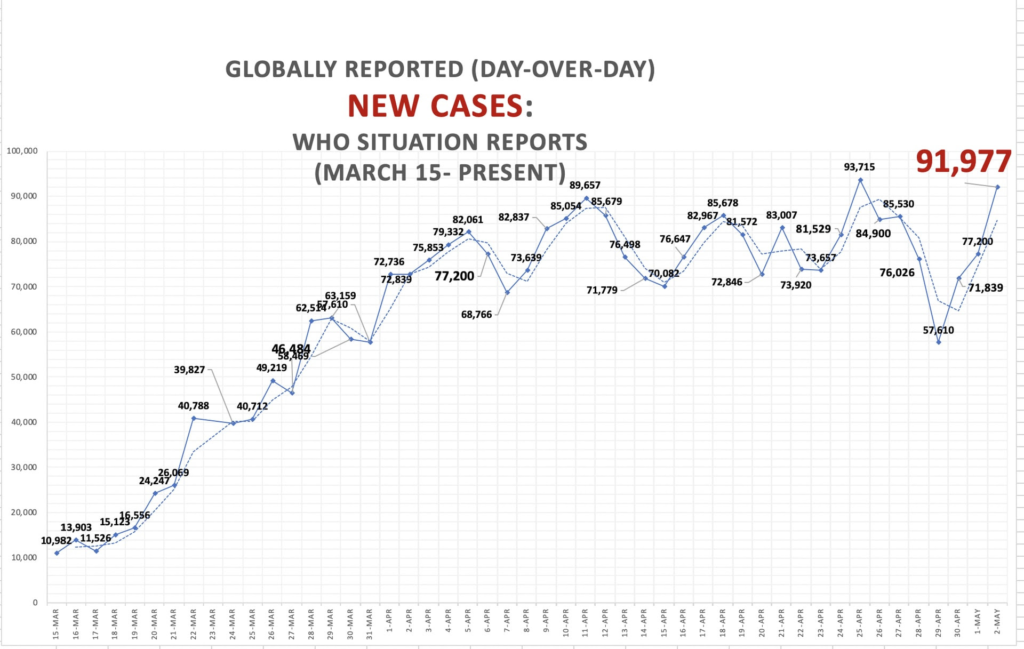
Source: AAIE COVID-19 Briefing #49, May 2, 2020
b) Cebu and the Philippines
As of May 3, the Cebu total confirmed = 1081. Note it is likely that the mass testing drive will be boosting some of these numbers, so do not panic, a sudden increase is not necessarily that it is getting worse, rather the cases that are already present are being identified. The DOH also note positively: The new confirmed cases have further decreased the case fatality rate or the percentage of deaths among those who are infected with COVID-19 from 1.5% to 1.38%. It is way below the global average of 6.4%.
As you will know from a previous communication, CIS has been planning to re-open classes as soon as the authorities permit. Officially this has been slated to be on May 18, 2020, the Monday following May 15th when the current ECQ had been extended to.
Many of you will be aware that the IATF (Inter-Agency Task Force) has recently made recommendations endorsed by President Duterte outlining conditions for a move from the current EQC to a General Community Quarantine (GCQ) in various regions deemed to be ready for the change. We just need to wait for an official announcement from the LGUs responsible for implementing the GCQ conditions and date of implementation, as they currently undertaking mass testing to determine if a region is ready to move to a GCQ.
a) So how would this impact CIS?
In general, here are a few specific areas of impact/potential impact to CIS (subject to confirmation by the Cebu City Mayor’s announcement of GCQ conditions):
- Indications are that schools (including CIS) will most likely be required to remain closed for the rest of the 19/20 SY. If this were the case, we would continue for the rest of the year with RL, and end of year activities will be modified to enable them to occur within the guidelines (no physical ceremonies). We expect to have this confirmed by the end of this week or early next week.
- There will be some easing of movement restrictions, but the recommendations for staying at and working from home for many continue. Also, young people (0-20YO) and senior citizens (60YO and older) are required to stay at home.
- Of some concern is a recommendation for September opening for schools. This is a general recommendation that might benefit local schools, but not private and independent schools. A number of groups have been working to have official flexibility with this condition, so we are hoping that we will still have the option of opening in August as scheduled. Please note we are still working on this, so do not make any plans or assumptions until it is clarified.
- Regardless of when we do re-open, our own risk mitigation measures and the government-stipulated GCQ conditions will require us to operate in a state of high alert. This means we will need to adjust our operations to create a vigilant environment that safeguards our community from the continuing risks associated with the Covid-19 pandemic. We will be asking for input over the coming weeks for these conditions.
- A summary of the IATF GCQ recommendations is linked here for your viewing [Note: these are pending applying to the local context by LGUs, so these could be adjusted].
We will let you know as soon as we have clarification on the GCQ conditions. In the meantime, please KEEP CALM AND CARRY ON, as the pragmatic Brits say! There is sufficient evidence that everything will work out in the end, and how well we do not will determine how fast that will take.
b) A word of warning and encouragement
This latest extension of restrictions on our freedom and past-normal way of life could lead to some of you (particularly students and senior citizens) to feel unsettled and/or discouraged. This is to be expected, and it will take some time to come to terms with it (the time will vary from person to person). At least this way we can properly prepare for a new SY opening, hopefully in August. Please be extra-sensitive this week with your family and colleagues, as many could be feeling some level of discouragement. In light of this, can we all please focus on being super supportive and encouraging this week, even more than you have been? Thanks!
April 13, 2020
CIS will continue to work towards the April 29th resumption of classes, unless we hear otherwise. At the same time we will be prepared for any extension of the ECQ conditions if the authorities consider that is necessary. We are responsible, respectful and prepared!
With three weeks of experience following the conditions of the ECQ, we hope the situation is getting more bearable. Let us consider how to support each other over the next few weeks. While it is prudent to consider all eventualities, it is also important we stay grounded in facts, and look after our community. As health and wellbeing is so easily impacted in high-stress situations such as the crisis we are in now, let us focus on areas that will help us or others who might be struggling.
Upcoming events of note
- April 17, Friday 9:00 – 9:45am: Virtual Coffee Meeting with the Superintendent
- April 24: Half day of remote Learning (Teacher curriculum PD day in PM – scheduled on calendar prior to class suspension)
- April 28: Half day of Remote Learning (Teacher PD day to prepare for return to classes on 29th- only if the government extends the ECQ period)
- April 29: Classes Resume (unless the government extends the ECQ period)
Please refer to the Newsflash for details and the CIS Event calendar for the complete calendar of school events. Be safe!
Making sense of it all – health and wellbeing ideas for the CIS community during the Covid-19 pandemic
This article by Arther C. Brooks (a Harvard professor who teaches a class on happiness) outlines three equations that are excellent to lead you to reflecting on what really matters in life. I will summarise the first two here – read the article for the full explanation and the third equation!
1. SUBJECTIVE WELL-BEING = GENES + CIRCUMSTANCES + HABITS
- “Subjective well-being” is preferred to “happiness” by social scientists as happiness is too subjective and vague.
- Genes account for between 44-52% of subjective well-being, and. circumstances account for 10-40%, depending on many factors.
- As genes and circumstances are outside of our sphere of influence, it is best to focus on Habits.
2: HABITS = FAITH + FAMILY + FRIENDS + WORK
- Simple put, “Enduring happiness comes from human relationships, productive work, and the transcendental elements of life”.
- Read the full article for more explanation on each of these three aspects.
The article also covers the 3rd equation which is a little more complicated, so I have not attempted to simplify it here! 3: SATISFACTION = WHAT YOU HAVE ÷ WHAT YOU WANT
There is a lot of research about how humans cope with loss, such as the Kubler-Ross model of the stages of grief. Here is a summary of the model by Nathan Wood Consulting:
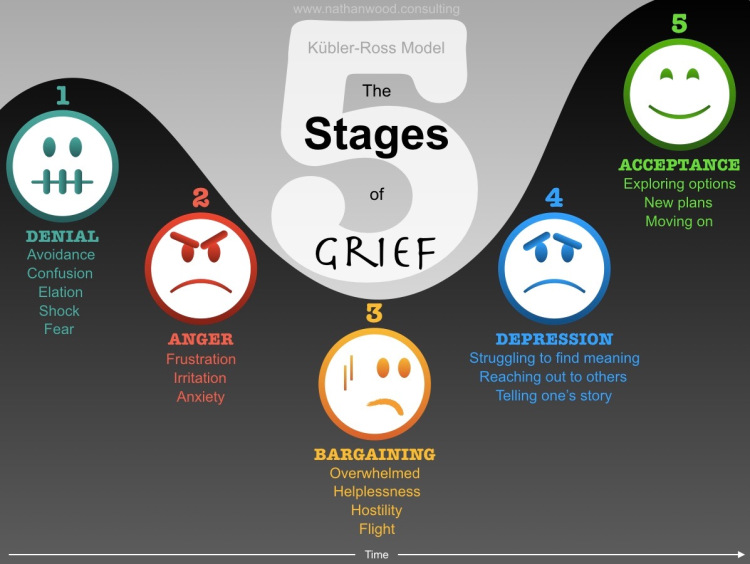
Going through a crisis such as the covid-19 pandemic involves various losses for all of us, and this can lead to grief. If we do not recognise this, it can lead to the stages of grief exhibiting themselves. The thing is, these stages are NOT linear, and they do not always follow the nice model as depicted.
Actually, I think this loss cycle (author unknown) is a little more realistic, as it shows how a multitude of emotions can be involved in a cyclic manner leading you down a loss vacuum until you climb out of it.
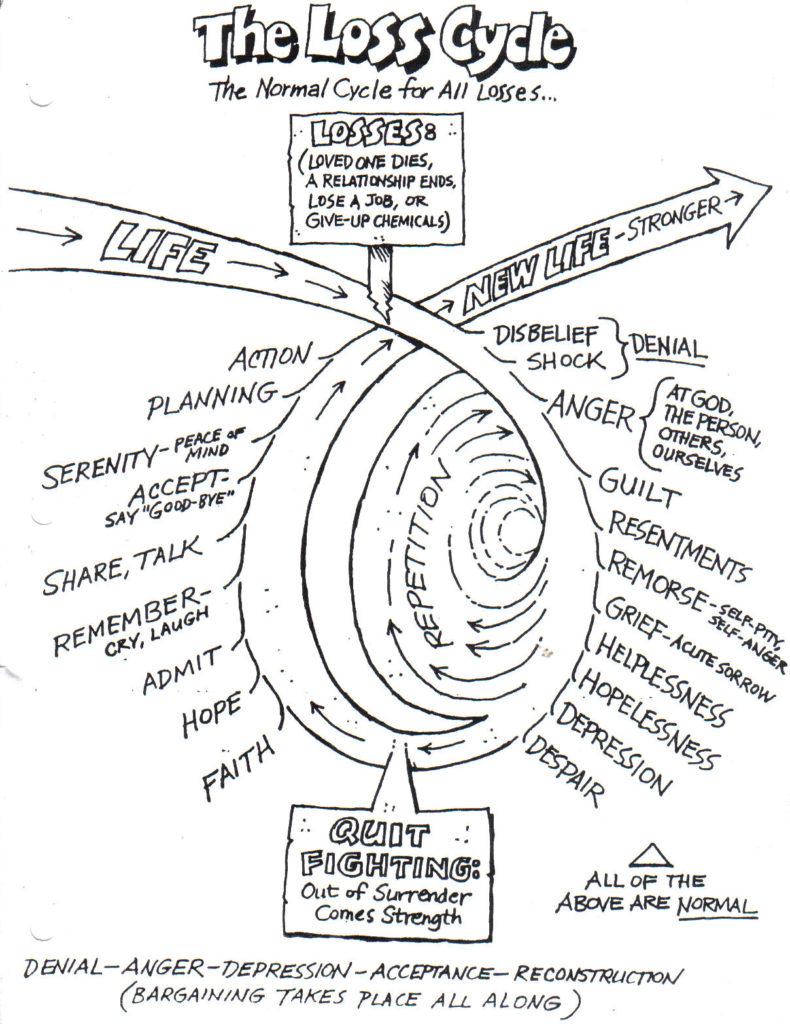
Scott Berinato (author) explores how the covid-19 pandemic has led to a “collective loss of normalcy”, in this Harvard Business Review (HBR) article on “That Discomfort You’re Feeling Is Grief” (free access). It is a good read to consider how loss can affect us all.
People react to crises in different ways. The important thing to remember is, you have a CHOICE in how you act – but you need to be aware of the choices before you can make them!
This diagram has been going around social media, and presents this concept in a thought provoking way. At school we talk about using growth mindsets (ref. Dr. Carol Dweck) to promote positive learning. This diagram is an application using the same concept.

(Diagram credited to Ken Seidu, Godfrey Okumu and Dr. Anne Mwangi by this site)
We are in a new paradigm. Who would have guessed home learning could be so challenging!
For parents who are finding their children are acting up, perhaps you can consider their change in patterns and exposure to stress could be causing anxiety, which in turn exhibits itself in disruptive behavior? Check out this infographic from gozen.com for any signs of anxiety:
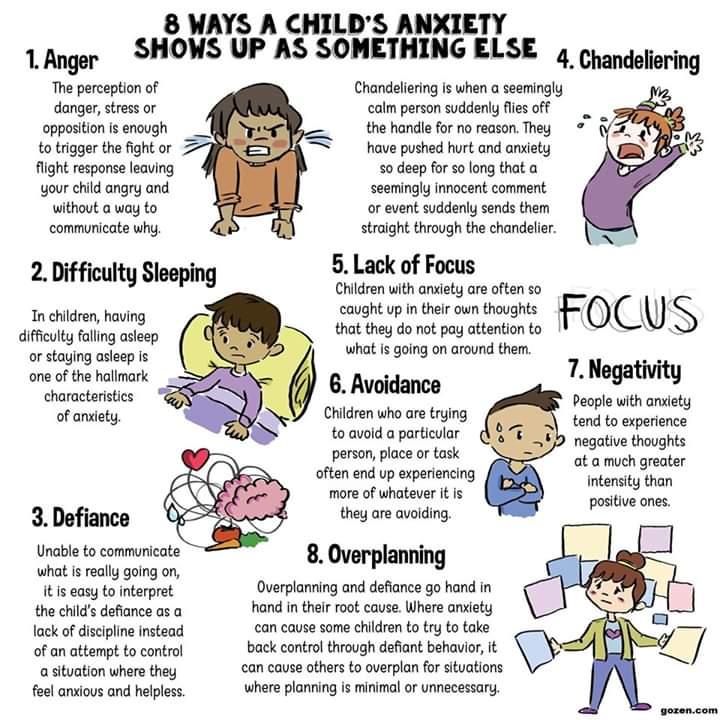
- For further reading, this article “8 Ways a Child’s Anxiety Can Show Up as Something Else” by Renee Jain goes into a little more detail.
- If you want a way to share information about the coronavirus to ES children, children’s publisher Nosy Crow has released a free information book explaining the coronavirus to children, which has been illustrated by The Gruffalo illustrator Axel Scheffler.
Did you know happiness is more contagious than unhappiness? We do not want a debilitating epidemic such as the Tanganyika laughter epidemic author Eric Barker mentions, but he poses an interesting idea. What if we start our own happiness “pandemic” and use it to fight the current one?!
In his article, Eric Barker suggests we can do this with the following actions:
- Spread Connection: 70% of your happiness comes from your relationships with other people.
- Spread Help: Ask people if they need anything. Others might need a little more than well wishes right now.
- Spread Gratitude: Gratitude is the undisputed heavyweight champ of happiness.
- Spread Optimism: Research shows being optimistic increases happiness, health, resilience and even luck.
How about it CIS? Are you up to starting a happiness pandemic?!
April 3, 2020
Congratulations for making it to our Easter Break! Today marks the completion of our first three weeks of Remote Learning, with this past week under Enhanced Community Quarantine conditions. Good effort everyone!
We are pretty sure you are now ready for a break, but as we are all confined to our residences, we wanted to give you a few options to try something different, novel, or fresh over the break. So, instead of getting bored, or binging on Netflix or video games, in addition to reading novels, why not visit the Louvre, the Guggenheim, the Museum of Modern Art, the San Diego Zoo, LEGOLAND and the Monterey Bay Aquarium – all without leaving your house, and if you want, all within a day! Please try to make at least some of these family activities too! Thanks to the CIS faculty for the ideas, and especially Mr. Jon Denton for collating them for our collective use!
Spring/Easter Break Activities for Students, Parents, Staff and Teachers
We continue to monitor the global and local situation, and make preparations for various scenarios in the event they happen.
CIS is currently scheduled to continue with remote learning during the Enhanced Community Quarantine until April 28th as ordered by Mayor Labella, and we intend to re-start on-campus classes on April 29th.
There is a chance this may be extended for a further two (or even possibly more) weeks depending on the situation, but we really have no way of predicting this, so we just need to be prepared while hoping for the best. Our remote learning system is working well, and our teachers are working extremely hard to make every attempt to ensure our students are getting purposeful learning activities that enable them to continue their learning, following our regular curriculum. Obviously this is a challenge for some types of learning, but with technology, we are able to modify our delivery so our students are still able to complete most of the work they need to, and are also gaining valuable skills with their online learning that they will be able to make use of in the future. When we get back to school, we intend to consolidate all the remote learning we have covered so as to minimise any loss of learning from the situation we have been placed in.
I find one of the best measures to make sense of what is going on and relate it to when this situation might be over is to look at the number of new covid-19 cases each day. You can see in the graph below that globally, the trend is still increasing as the virus spreads to more countries, but it is reassuring to note that there are days when it also declines. Once the global peak has been reached, models based on experience with the virus thus far predict a steady decline, however, this really depends on how well each country is able to contain and stamp out the virus when it pops up.
In the Philippines, it is still too early to tell how well the Enhanced Community Quarantine is working, but in another week we should have a much clearer picture.

Source: AAIE COVID-19 BRIEFING #34 April 2, 2020
Psychiatrists are suggesting we use the term “physical distancing” (or some suggest spatial distancing) instead of using “Social Distancing“. This subtle change in the use of language helps us to consider how we can continue socialization, even if we do it virtually.
As we head into the break, please do consider ways you can stay in touch with your friends, family, teachers, and even the wider community. This will help fight off the danger of feeling isolated and help you to avoid feeling lonely. Not only is this an unpleasant experience, studies have shown loneliness negatively impacts your health in a number of ways.
March 27, 2020
Cebu will be entering a phase of Enhanced Community Quarantine (ECQ) conditions as directed by the City Mayor, Mr. Labella from noon on Saturday, March 28. To reiterate the key message in the email sent to families on how this will impact CIS, we will continue with our remote learning protocol as planned, but with the order extending our remote learning after Easter break to April 28, unless the order is lifted.
Please keep in mind that while it is inconvenient, the purpose of executive order conditions are to try to keep us collectively as safe as possible while the global community attempt to reign in the pandemic. Please consider how you might help other members of our community over this time, such as calling to check in on them. If you are having difficulties or are feeling down, do not hesitate to reach out to other families, teachers or admin for support. We are a family community and we care about each one of you. Take care and stay safe!
March 22, 2020
March 20, 2020
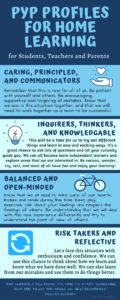
The COVID-19 situation around the world continues to be a concern in many countries. As of writing, we only have 1 case of Covid-19 in Cebu, and we support the authorities attempts to use social distancing in order to attempt to avoid a serious outbreak. Please continue to follow their advice, and keep a focus on your own health and wellbeing. For ideas on how you might do this is to consider the IB Learner Profile Attributes applied to our specific situation, as presented by J. von Estorff:
March 16, 2020
On March 15th, Mayor Labella issued an Executive Order (052) expanding the previous order to place Cebu City under community quarantine and extending the suspension of school classes until April 14. CIS will, therefore, continue with our remote learning systems over the next 3 weeks, which brings us to our Easter/Spring Holidays. Unless we are instructed otherwise, we currently plan to resume classes on April 15 after our Spring Break.
Please be aware that Cebu Province Governor Ms. Gwendolyn Garcia has also just expanded her earlier order for mandatory quarantine from various domestic locations to Executive Order No. 5-J, ordering ALL persons arriving by air from ANY FOREIGN COUNTRY (from Tuesday 17th) to be quarantined upon entry to Cebu. Filipinos will be placed under home, foreign nationals shall undergo mandatory quarantine at designated quarantine facilities at their own cost.
This order does not give an end date but earlier orders were for 30 days, so families that are leaving Cebu need to consider the possibility of being quarantined upon their return if they come back before the order is lifted, as well as the possibility that the order is extended.
Actions taken by the CIS Administration to comply with the orders:
- Suspension of classes until April 14, 2020
- Students will engage in remote learning during suspension of classes. Teachers will provide the best distance learning opportunities possible
- CIS makes use of a multitude of online tools to help continue with collaboration, projects, discussions and developing critical thinking, amongst other skills
- Heightened security and health checks are in place for those who need to come on campus
- Deep cleaning and disinfecting of classrooms and other school facilities, including air conditioning, is ongoing.
The suspension of classes and associated community quarantine is considered the most prudent action to take by numerous experts and one that will save numerous lives (here is a good explanation of the benefits of social distancing by the Washington Post).
Please keep in mind the purpose of the closure is to stop the spread of Covid-19. It will be challenging at times, but please keep up hygiene protocols you are all familiar with now, and follow all the health guidelines regarding unnecessary group gatherings and avoiding public areas as much as possible. At the same time, keep it in perspective, stay safe, and we will pull through this together as a strong, caring community.
March 6, 2020
We continue to monitor the Covid-19 coronavirus situation, and will update you as the situation progresses. This past week has seen continued increases in the number of cases outside of China, but it is promising to note the continued decrease in new cases within China.
The school remains very vigilant with our Covid-19 threat matrix and we continue to check all visitors onto campus, as well as students and families that have been traveling outside the country. Additionally, all traveling families are required to notify the school of their travel plans, and any family members who visit areas that have been identified ‘Hot-Spots’ are required to remain off campus for 14 days following their return. If families or family members are considering travel, please remember that the possibility of a 14-day restriction is always possible.
February 14, 2020
The health and safety of CIS’s community remains our highest priority, and we continue to monitor the coronavirus situation daily as we attempt to keep a balance between mitigating risks to an acceptable level in what is an evolving situation. We will continue to take necessary precautions as well as adapt our practices as the situation requires, keeping the best interests of the health and safety of our community and visitors a priority.
February 7, 2020
In response to the international concerns around the Novel Coronavirus, CIS continues to be very aware of the international and local news, and while not overreacting to the threat, we still want to take all reports seriously. You will see that additional hand sanitizers have been placed in each class and teachers are talking with students about the importance of hand cleaning. Hand cleaning has been identified by the WHO as the most effective defense against the Coronavirus.
January 31, 2020
The health and safety of our entire school community is our highest priority. We will constantly do our best to ensure we use the most appropriate risk mitigation procedures possible to address the threats we are facing.
- CIS is currently not accepting walk-in visitors (visitors must rearrange their visit in order to allow us to screen them for potential threat).
- If you have travelled outside of Cebu within the past 14 days, please inform our clinic or school nurse stating when and where you travelled, and any info regarding the potential exposure you may have had.
Please keep your child home if they have any flu-like symptoms. You need to obtain a doctor’s note before returning to school. - All returning students must check in to the clinic with their medical note upon return before going to class.
- Field-trips to high risk areas not permitted (any threats to be identified on Risk Assessment Form and trip viability considered).
January 29, 2020






